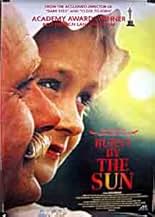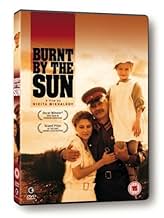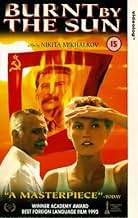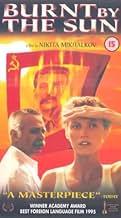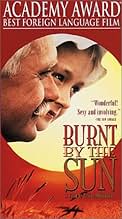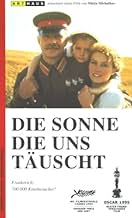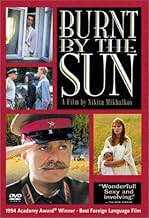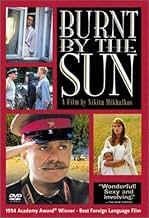IMDb-BEWERTUNG
7,8/10
16.857
IHRE BEWERTUNG
Füge eine Handlung in deiner Sprache hinzuIn the USSR in 1936, shadows of Stalin's repressions fall on a famous, revolutionary hero. The accusations of him being a foreign spy are nonsense, and everyone knows that. However, a slow p... Alles lesenIn the USSR in 1936, shadows of Stalin's repressions fall on a famous, revolutionary hero. The accusations of him being a foreign spy are nonsense, and everyone knows that. However, a slow process of his downfall has already started.In the USSR in 1936, shadows of Stalin's repressions fall on a famous, revolutionary hero. The accusations of him being a foreign spy are nonsense, and everyone knows that. However, a slow process of his downfall has already started.
- 1 Oscar gewonnen
- 4 Gewinne & 9 Nominierungen insgesamt
Ingeborga Dapkunaite
- Marusya
- (as Ingeborga Dapkunayte)
Nadezhda Mikhalkova
- Nadya
- (as Nadya Mikhalkova)
André Oumansky
- Filipp
- (as Andre Umanskiy)
Empfohlene Bewertungen
This is an interestingly broken-backed film. Set during the Stalinist era during one idyllic summer, it begins by contrasting the lives of Dmitriy (Oleg Menshikov) and Sergey (Nikita Mikhailkov) - the one a dilettante musician and pianist, the other a colonel in the Russian army and favorite of the premier. They both have a claim on Marusya (Ingeborg Dapkunaite): Srgey is married to her, and Dmitriy was a former lover of hers. It seems that the film's moral scheme is relatively straightforward: Dmitriy is talented but feckless, while Sergey seems virtually untouchable - not only does he have a great career, but he is happily married as well. However director Mikhailkov turns the tables on our expectations and thereby transforms BURNT BY THE SUN into a penetrating analysis of how dictatorships corrupt everyone around them. Concepts of 'good' and 'evil# no longer prevail: everyone simply does what it takes in order to survive. The ending is both shocking yet predictable. Visually speaking, the film contrasts the idyllic surroundings of Dmitriy's dacha with the behavior of the protagonists - it seems that no one can actively enjoy the delights of glorious summer weather, for fear of being discovered. Life at that time must have been precarious, with no one actually being sure as to what would happen to them next. BURNT BY THE SUN is slow-moving, but Mikhailkov's camera has an eye for telling detail and significant gestures. Definitely worth watching.
You know, here, in Moscow, the critics do their best to show that Nikita Mikhalkov makes popular pictures which aren't to be considered serious. To hear that "The Barber of Siberia" is a stupid sentimental movie is quite common nowadays.
But the more time passes from his next in turn production, the more a "strange" effect seems to take place: his films at last are rated according to their true value and not to somebody's opinion about them. It is always hard to say that something new is really good, but some time later...
"Utoml'ennye Solntsem" is not a very emotional movie. I don't suppose you'd cry when watching it. But my opinion is that it's a brilliant one. It is historically authentic (I've studied that period of time quite carefully so I think I have a right to say so). And no-one on this site seems to notice the love story in the film, which actually brought about the whole tragedy (remember, Kotov made Mitya work for NKVD). It was marvellously played by Oleg Men'shikov (my favourite actor) and Ingeborga Dapkunaite, a remarkable Lithuanian actress. And Mikhalkov himself, of course - "Kot" means "cat", by the way. Many people endow him with the characteristics of Kotov which only shows that he played his role well. A good actor is always attributed his character's traits.
But still, for me the main feature of the film is the world of Mitya's soul created by Men'shikov. A young, talented boy with brilliant prospects is what Mitya was. He gets involved in the war, goes through many ordeals, then comes home and falls in love with the girl he knew from her very birth, Marousya. But their happiness is too short. He is given a choice: to work for NKVD or...to commit suicide. He's only 24, and he wants to live. But hope for future slowly disappears as life goes on, cruel and senseless. When Mitya appears on the dacha of Marousya's parents, his soul is almost a wreck. But the last chance is killed when he sees that, after a suicide attempt, after months of despair, Marousya has married Kotov and doesn't want to go through everything again. Therefore Mitya begins to fulfill his revenge.
But the more time passes from his next in turn production, the more a "strange" effect seems to take place: his films at last are rated according to their true value and not to somebody's opinion about them. It is always hard to say that something new is really good, but some time later...
"Utoml'ennye Solntsem" is not a very emotional movie. I don't suppose you'd cry when watching it. But my opinion is that it's a brilliant one. It is historically authentic (I've studied that period of time quite carefully so I think I have a right to say so). And no-one on this site seems to notice the love story in the film, which actually brought about the whole tragedy (remember, Kotov made Mitya work for NKVD). It was marvellously played by Oleg Men'shikov (my favourite actor) and Ingeborga Dapkunaite, a remarkable Lithuanian actress. And Mikhalkov himself, of course - "Kot" means "cat", by the way. Many people endow him with the characteristics of Kotov which only shows that he played his role well. A good actor is always attributed his character's traits.
But still, for me the main feature of the film is the world of Mitya's soul created by Men'shikov. A young, talented boy with brilliant prospects is what Mitya was. He gets involved in the war, goes through many ordeals, then comes home and falls in love with the girl he knew from her very birth, Marousya. But their happiness is too short. He is given a choice: to work for NKVD or...to commit suicide. He's only 24, and he wants to live. But hope for future slowly disappears as life goes on, cruel and senseless. When Mitya appears on the dacha of Marousya's parents, his soul is almost a wreck. But the last chance is killed when he sees that, after a suicide attempt, after months of despair, Marousya has married Kotov and doesn't want to go through everything again. Therefore Mitya begins to fulfill his revenge.
Despite its dark subject matter, this is a very positive and heart warming movie. It shows Stalinism without the Western propaganda, through the lens of great Soviet people that made everything good even under Stalin possible. An ode of love to the great Russian and Soviet nation. Definitely recommended.
This movie is about the most desperate and tragic situation in the human life. This is when our life is determined by external forces. Even the most basic form of happiness - being with you family, enjoying your child - were impossible in the Russia of Stalin.
Sometimes I think about people who were borne 20 years before World War II in Germany, Poland or Russia. I wonder whether they had a feeling that the life was extremely unfair to them. The feeling that your fate was determined by the time you were borne in, and that you couldn't do anything at all to somehow change it. If Mitya, Kotov and Marusya would not die then, they would have to wait for 50 years to be able to truly understand what happened to them and who was to blame for it.
I was puzzled why Mitya picked up the phone and agreed to arrest Kotov. Why didn't he stop his suffering immediately, as he knew that he had no other option than ruining lives of the people he loved. Was it his hatred towards Kotov and the opportunity to take revenge for being expelled for 10 years? Was it the last hope that his love to Marusya would reverse her marriage?
After watched the film again & again I decided that he knew from the offset there was no way out. Mitya went to his old home because he wanted just one thing - to say farewell to his dream that the old times would ever return. The dream that made him betray his comrades in the 20th, and come back from France in the 30th.
I'm so happy that we live in freedom and that the iron curtain fell.
Sometimes I think about people who were borne 20 years before World War II in Germany, Poland or Russia. I wonder whether they had a feeling that the life was extremely unfair to them. The feeling that your fate was determined by the time you were borne in, and that you couldn't do anything at all to somehow change it. If Mitya, Kotov and Marusya would not die then, they would have to wait for 50 years to be able to truly understand what happened to them and who was to blame for it.
I was puzzled why Mitya picked up the phone and agreed to arrest Kotov. Why didn't he stop his suffering immediately, as he knew that he had no other option than ruining lives of the people he loved. Was it his hatred towards Kotov and the opportunity to take revenge for being expelled for 10 years? Was it the last hope that his love to Marusya would reverse her marriage?
After watched the film again & again I decided that he knew from the offset there was no way out. Mitya went to his old home because he wanted just one thing - to say farewell to his dream that the old times would ever return. The dream that made him betray his comrades in the 20th, and come back from France in the 30th.
I'm so happy that we live in freedom and that the iron curtain fell.
I just watched and loved this movie.
It originally portrays the contrast in character, personality, viewpoint, and the relative consequences of the Revolution upon two people -
a) Mitya, a handsome, charming, romantic, poetic, musical, child-loving man who before the movie began, lived in rural Russia, grew up with a girl who was 7 when he was conscripted into World War I, and deeply loved her parents, cousins, aunts, uncles and the household servants, and
b) Kotov, an older man, military, probably more courageous and less intelligent, bluff and physical, sentimental and less artistic, stronger but simpler, equally child-loving, from a poorer background.
Enemies in the Revolution, their behavior toward each other begins with cruelty by Kotov toward Mitya, Mitya's forced cruelty to others, and a changed and cruel man now (and knowing it) Mitya's cruelty to Kotov. And yes, a woman is also in the mix. The story is told as much through Kotov's eyes as through Mitya's.
And guess what? With all this cruelty, Kotov and Mitya are both people you'd love to spend the day with.
It's beautifully photographed - the same wonderful languor as watching say, Turgenev's A Month in the Country, the child is enchanting, the story is absolutely fascinating - far more original than such other "political" movies as The Conformist or The Garden of the Finzi-Continis. The movie is about social class, temperament, and how freely people make decisions in their lives, about love for the opposite sex, children, and country. It's compelling - you will truly always remember this movie.
It originally portrays the contrast in character, personality, viewpoint, and the relative consequences of the Revolution upon two people -
a) Mitya, a handsome, charming, romantic, poetic, musical, child-loving man who before the movie began, lived in rural Russia, grew up with a girl who was 7 when he was conscripted into World War I, and deeply loved her parents, cousins, aunts, uncles and the household servants, and
b) Kotov, an older man, military, probably more courageous and less intelligent, bluff and physical, sentimental and less artistic, stronger but simpler, equally child-loving, from a poorer background.
Enemies in the Revolution, their behavior toward each other begins with cruelty by Kotov toward Mitya, Mitya's forced cruelty to others, and a changed and cruel man now (and knowing it) Mitya's cruelty to Kotov. And yes, a woman is also in the mix. The story is told as much through Kotov's eyes as through Mitya's.
And guess what? With all this cruelty, Kotov and Mitya are both people you'd love to spend the day with.
It's beautifully photographed - the same wonderful languor as watching say, Turgenev's A Month in the Country, the child is enchanting, the story is absolutely fascinating - far more original than such other "political" movies as The Conformist or The Garden of the Finzi-Continis. The movie is about social class, temperament, and how freely people make decisions in their lives, about love for the opposite sex, children, and country. It's compelling - you will truly always remember this movie.
Wusstest du schon
- WissenswertesOne of four Russian films ever to win Academy Award for Best Foreign Language Film. The others are Krieg und Frieden (1965), Uzala, der Kirgise (1975) and Moskau glaubt den Tränen nicht (1980)
- VerbindungenFeatured in Namedni 1961-2003: Nasha Era: Namedni 1995 (1999)
- SoundtracksUtomlennoe solntse
Written by Jerzy Petersburski (as Ezhi Petersburgskiy)
Lyrics by Iosif Alvek (uncredited)
Performed by Mark Simkin (singer), Efim Vyshkin (violin), Aleksandr Bashkatov (bayan), and Viktor Agapov (guitar)
Played by an instrumental quartet during opening credits as a film's theme song
Top-Auswahl
Melde dich zum Bewerten an und greife auf die Watchlist für personalisierte Empfehlungen zu.
- How long is Burnt by the Sun?Powered by Alexa
Details
- Erscheinungsdatum
- Herkunftsländer
- Offizieller Standort
- Sprachen
- Auch bekannt als
- Burnt by the Sun
- Drehorte
- Produktionsfirmen
- Weitere beteiligte Unternehmen bei IMDbPro anzeigen
Box Office
- Budget
- 2.800.000 $ (geschätzt)
- Bruttoertrag in den USA und Kanada
- 2.302.338 $
- Eröffnungswochenende in den USA und in Kanada
- 60.074 $
- 23. Apr. 1995
- Weltweiter Bruttoertrag
- 2.313.461 $
- Laufzeit2 Stunden 15 Minuten
- Farbe
- Sound-Mix
- Seitenverhältnis
- 1.66 : 1
Zu dieser Seite beitragen
Bearbeitung vorschlagen oder fehlenden Inhalt hinzufügen

Oberste Lücke
By what name was Die Sonne, die uns täuscht (1994) officially released in India in English?
Antwort

